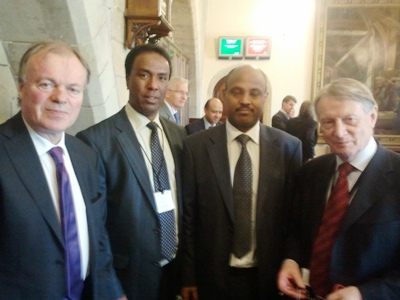|
Foreign Minister Omar Talks about Somaliland’s Foreign Policy in the
Houses of Parliament in London, 23 May 2012

The Foreign Minister, Dr Mohamed A. Omar, attended a briefing at the
Houses of Parliament in London on 23 May in which he talked about
Somaliland’s foreign policy. The briefing was hosted by the Africa
All Party Parliamentary Group and the Somalia and Somaliland All
Party Parliament Group and was chaired by Alun Michael MP. The event
was attended by members of both Houses and the Diplomatic Corps.
Dr Omar drew attention to the fact ‘that in 1960, Somaliland was
only the second country in East Africa to achieve independence from
Britain, after Sudan in 1956.’
The Foreign Minister went on ‘Following its rebirth in 1991,
Somaliland has come a long way. Having asserted our independence, we
went on to establish peace and stability, and to build a genuine
democracy. With help from our Diaspora, we rebuilt the country after
the disastrous civil war which the union with Somalia brought in its
train.’
Listing the recent achievements of Somaliland’s foreign policy, Dr
Omar noted that ‘Countries such as Turkey, Denmark, Djibouti,
Ethiopia and the UK have, or are in the process of establishing,
development or liaison offices in Hargeisa, the capital city of
Somaliland, and more and more foreign diplomats and UN agents are
seeing Somaliland as a routine stop on any visit to the Horn of
Africa. This is a huge diplomatic achievement for Somaliland.’
‘Somaliland has increasingly asserted itself as an integral regional
partner in the Horn of Africa, something that contributed to the
recent proposal to make Somaliland an interim member of the
Intergovernmental Authority on Development, IGAD.’
The Foreign Minister went on to emphasize ‘we were treated as an
equal partner on par with other African states at the London
Conference on Somalia on 23 February. President Silanyo was given
the courtesy of meetings with the British Foreign Secretary and
International Development Secretary; he sat next to the Prime
Minister of Qatar and the Foreign Minister of Yemen during the
conference; and he delivered a speech which set out Somaliland’s
views on how to stabilize Somalia. He also had meetings with several
European leaders in the margins of the event.’
Dr Omar stated, ‘these developments show how Somaliland is making
incremental, but steady progress along the road to being recognized
as an independent state. I cannot say when the international
community will finally recognize us, but I am certain that that day
will come.’
Touching on relations with Somalia, the Foreign Minister said:
‘While we will never allow Somaliland to return to unity with
Somalia, we wish our neighbour well, and stand ready to offer her
advice and discuss matters of mutual bilateral interest on a basis
of mutual respect and from our vantage point as a sovereign,
separate entity.’
Speaking in the Houses of Parliament, Dr Omar mentioned Somaliland’s
democracy: ‘we are justifiably proud of Somaliland’s democracy: it
is one of the greatest achievements of the past 21 years. The
presidential elections which took place in June 2010 were simply the
latest in a series of several internationally-monitored elections.’
The Foreign Minister thanked Britain for its development assistance:
‘The UK provided more than £14 million in aid to Somaliland in 2011,
and that assistance is set to increase. I would like to acknowledge
my deepest appreciation for that support.’
Dr Omar concluded, ‘the past year has been unprecedentedly busy for
Somaliland’s foreign policy. Our international profile is much
higher than it was before, and we have shown that we meet the basic
criteria for statehood –a permanent population, a functioning
government, defined borders, and the capacity to enter into
relations and treaties with other states. We are making incremental
progress towards recognition, but our foreign policy is more than
that: we are also promoting closer economic ties with our
neighbours, encouraging more foreign direct investment,
collaborating in regional and international efforts to combat
piracy, terrorism and jihadism, and offering our views on how to
stabilize Somalia, which is a new addition to our foreign policy
aims.’


|